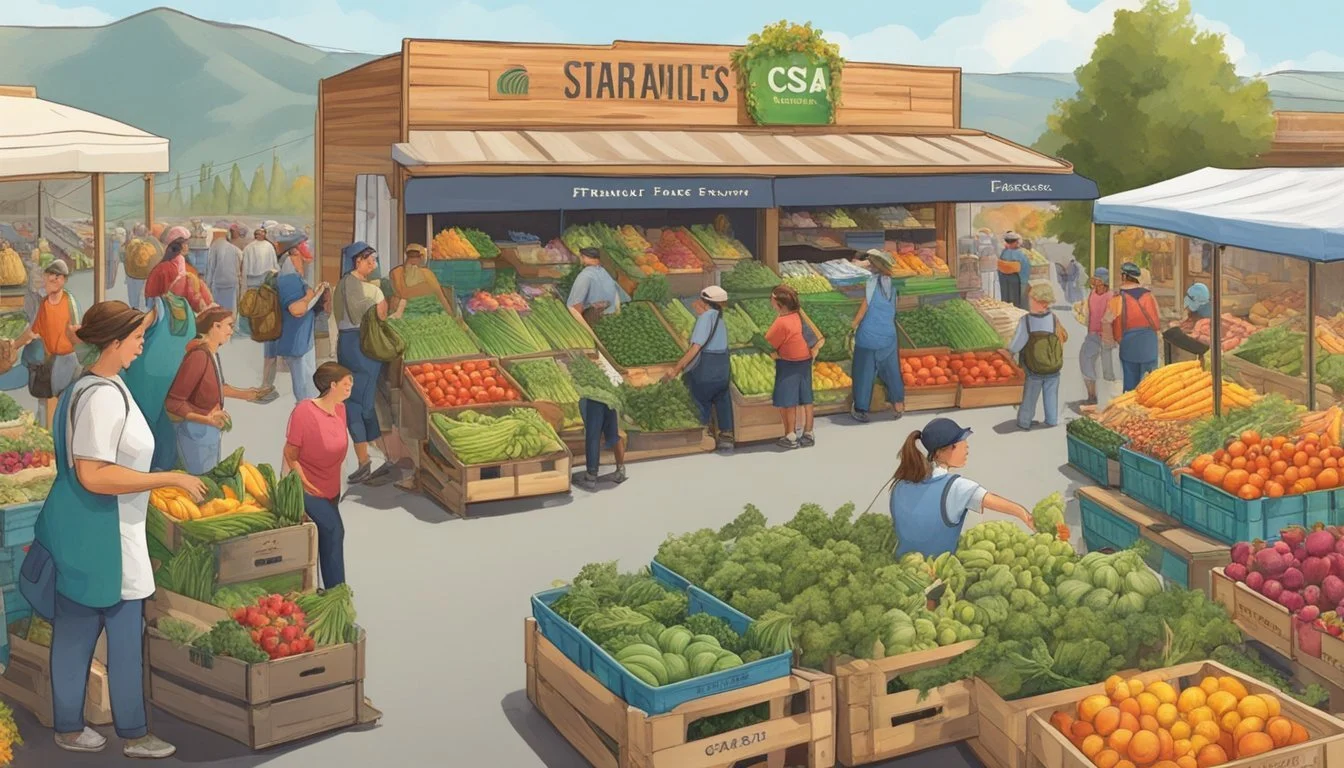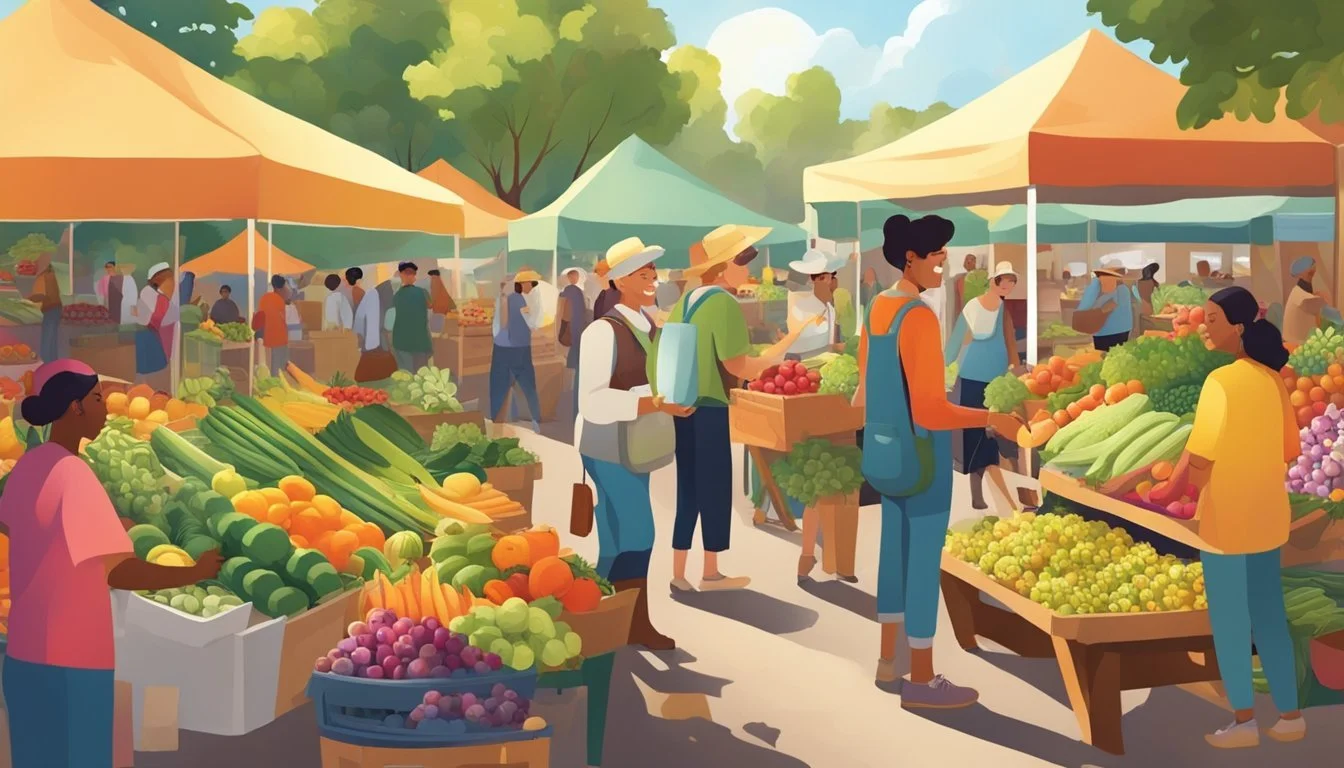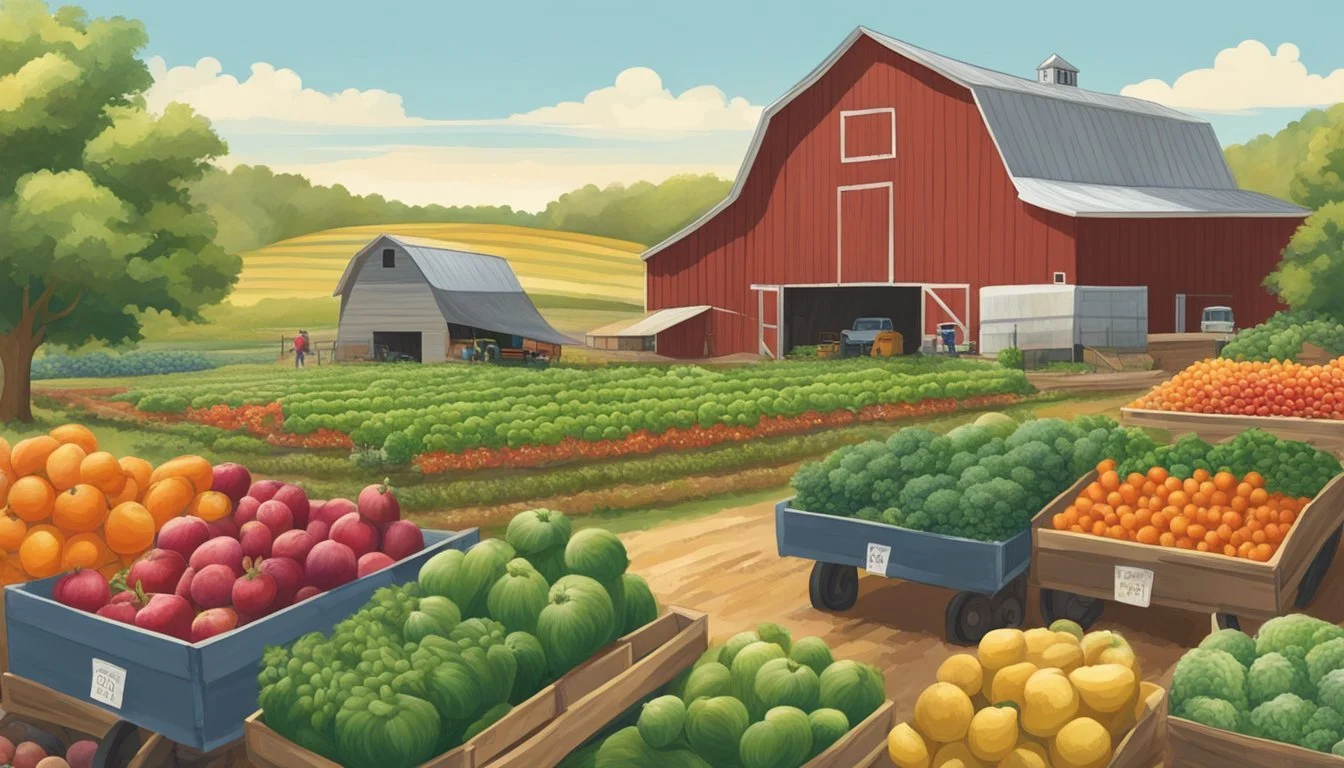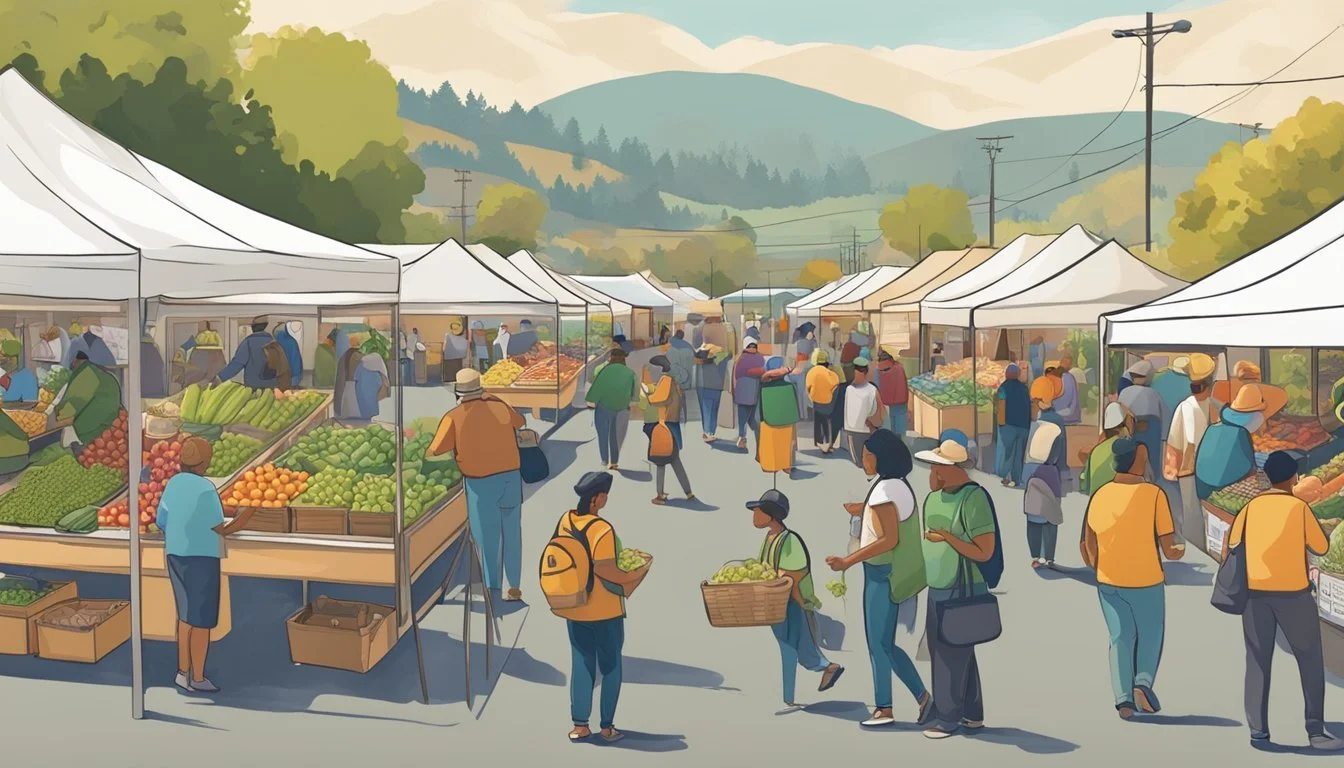Community Supported Agriculture (CSA) in Fremont, CA
A Guide to Local Farm Partnerships
Community Supported Agriculture, or CSA, has taken root in Fremont, CA, as an innovative way to connect local farmers directly with consumers. This unique model of agriculture allows residents in the city and the greater Bay Area to purchase "shares" from local farms, committing to a season's worth of fresh produce and, in some cases, additional farm products. The CSA model fosters a relationship between growers and community members, with the dual promise of access to freshly harvested food and the support of sustainable agricultural practices.
In Fremont and surrounding areas, CSA programs provide a plethora of benefits. They offer a direct pipeline for consumers to receive high-quality, locally-grown fruits and vegetables while also allowing farmers to gain a reliable source of income. Participants typically receive a weekly or bi-weekly box of seasonal produce, delivered to various convenient locations or sometimes available for pick-up at the farms themselves. This system emphasizes community and food security, as it supports smaller-scale farmers and keeps food dollars within the local economy.
The Bay Area's emphasis on health and sustainability mirrors the principles of CSA, making it a fitting match for the community-centric culture of Fremont. The variety of CSA options available in the area ensures that residents have access to an array of organic and traditionally farmed goods, reflecting California's rich agricultural diversity. With a focus on seasonal goods, CSAs encourage eating patterns that align with the natural growing cycles, emphasizing a connection to the land and the seasons.
Understanding CSA
Community Supported Agriculture, commonly known as CSA, represents a model where individuals directly support local farmers and share in the harvest. This model is both a partnership and a commitment to sustainable agriculture.
Concept and History
The origin of CSA can be traced back to the 1960s in Europe and Japan, where consumers interested in safe food and farmers seeking stable markets for their crops pioneered this initiative. It emerged in the United States in the 1980s and has since grown in popularity. CSA allows members of the community to purchase a "share" from a farmer; in return, they receive seasonal produce and sometimes additional farm products throughout the farming season.
Benefits of CSA
Community Engagement: CSA fosters a sense of community involvement and support, bridging the gap between consumers and farmers. Members often have direct access to the farm and its operations, which highlights transparency and trust.
Healthier Choices: Shareholders consume more fresh, local, and organic produce, contributing to better health outcomes.
Economic Stability for Farmers: Pre-paid CSA memberships provide upfront capital for farmers, stabilizing their season's income.
Sustainability: Local sourcing reduces carbon footprint through minimized transportation, and eco-friendly packaging is often a priority.
CSA Models
There are various models of CSA, each with its own structure and degree of involvement required from the members.
Traditional CSA: Members pay upfront for a season and receive a weekly or biweekly share of the farm's harvest.
Market-Style CSA: Members have some choice in selecting the produce that goes into their share during pickup at a farmers' market or farm stand.
Boxed-Share CSA: Pre-packed boxes are delivered to a drop-off location or directly to the member's home.
CSA models may vary in the level of membership commitment, share size, payment plans, and the inclusion of non-produce farm products. Each model emphasizes a connection to the farm and transparent, direct sales that benefit both the community and the farmers.
Starting with CSA in Fremont
In Fremont, California, consumers can access fresh, local, seasonal food by joining a Community Supported Agriculture (CSA) program. This approach connects residents with nearby farms and facilitates direct support of local agriculture.
Choosing a CSA Program
When selecting a CSA program in Fremont, individuals should consider the variety of produce offered and the farming practices employed. Eatwell Farm and Live Earth Farm are notable for their commitment to organic farming and a rich selection of vegetables and fruits. Prospective members should evaluate the frequency of delivery, the length of the subscription period, and whether the farms offer additional goods beyond produce, such as eggs or honey.
Subscription and Membership
A CSA membership typically involves purchasing a share at the beginning of the growing season. This upfront subscription not only entitles members to a regular allotment of farm products but also supports the farmer's operational costs. Full Belly Farm, for instance, offers weekly organic CSA produce boxes. One must order their box and manage their membership details through the farm's official channels.
Pickup and Delivery Options
CSA subscribers in Fremont generally have pickup and delivery options. Most farms operate on a weekly pickup schedule, where members collect their shares from designated pick up locations. For instance, the pickup window for one of the farms is between 2:30-6:30pm on Fridays. However, delivery services are also available for those who prefer to have their box delivered directly to their home or an agreed-upon location, ensuring convenience and flexibility.
By joining a CSA, members in Fremont forge a valuable bond with the farming network and gain access to nutritious, locally-sourced food while supporting sustainable agricultural practices.
What to Expect from Fremont CSA
When joining a Fremont CSA, members can anticipate a diverse selection of fresh, locally-sourced products throughout the harvest season, including a range of share sizes to suit individual or family needs.
Types of Products Offered
CSA members in Fremont can look forward to an array of farm products from local farmers. The offerings typically include a variety of:
Vegetables: A wide range of both common and unique vegetables, adhering to seasonal availability.
Fruit: Seasonal fruits are provided, often picked at the peak of ripeness for the best flavor.
Eggs: Fresh eggs from chickens raised on local farms.
Meat: Options can include grass-fed beef, free-range poultry, and more, depending on the specific CSA.
Cheese and Bread: Some CSAs include locally produced cheese, artisanal bread, and other dairy products.
Flowers: Occasionally, fresh flowers may be included in CSA boxes.
Understanding Share Sizes
Share sizes in Fremont CSAs are designed to accommodate different types of households, and they typically fall into the following categories:
Individual Share: suitable for one person
Small Share: ideal for two people or individuals with a higher vegetable intake
Family Share: designed to meet the needs of a family, generally sufficient for 3-4 people
Exact contents and quantities may vary week to week based on seasonal production and harvest yields.
Seasonality and Variety
Participating in a CSA means embracing the natural ebb and flow of the harvest season. CSA members receive seasonal produce boxes filled with the freshest picks from local fields. They can expect:
Spring: Greens, herbs, and early root vegetables.
Summer: A bountiful supply of berries, summer squash, tomatoes, and more.
Fall: Harvest of apples, pumpkins, and late-season greens.
Winter: Availability might include storage crops and winter greens, depending on climate and farm capabilities.
Overall, Fremont CSA members receive fresh, organic, seasonal produce that supports local farmers and contributes to a sustainable food system.
Local Farms Participating in CSA
Fremont, CA, offers a rich tapestry of Community Supported Agriculture programs where fresh, seasonal produce is just a subscription away. These CSAs provide an avenue for residents to directly support local farms and enjoy the bounty of their harvest.
Profiles of Local CSAs
Eatwell Farm: Located in Dixon, just outside of Fremont, Eatwell Farm is known for its diverse offering of organic produce. This CSA allows members to receive farm-fresh products on a regular basis while supporting sustainable agriculture practices.
Greenhearts Family Farm: Offering a variety of subscription boxes, this farm provides a range of organic vegetables and fruits. They emphasize connecting the community with the rhythms of farm life.
Blue House Farm: Nestled in the nearby region, Blue House Farm takes pride in supplying organically grown vegetables, fruits, and flowers, focusing on ecological stewardship.
Ananda Valley Farm: Committed to creating harmony with the land, Ananda Valley Farm offers a CSA program that brings organic, locally-grown foods to the tables of Fremont families.
Fifth Crow Farm: With a focus on regenerative farming, Fifth Crow Farm provides a CSA that features a rich selection of seasonal produce that supports the health of the land and its inhabitants.
Eating with the Seasons
Members of Fremont's CSAs enjoy fruits and vegetables that reflect the rhythm of the seasons. The CSA program ensures:
Spring: Tender greens, sweet strawberries, and crisp peas.
Summer: Juicy tomatoes, succulent peaches, and plump berries.
Fall: Earthy squashes, root vegetables, and hearty greens.
Winter: Citrus fruits, leafy kale, and versatile cauliflowers.
By eating with the seasons, CSA members receive produce at its peak of flavor, nutritional value, and environmental sustainability.
Direct Support of Local Farmers
Subscribing to a CSA in Fremont is more than just receiving a regular assortment of fresh produce; it's a commitment to the local farmers and the land they cultivate.
Investing in Local Agriculture: CSA members directly fund the operations and livelihoods of farmers in and around Fremont.
Sustaining Farming Practices: With upfront investments, farmers can focus on quality and sustainable agriculture practices, ensuring the health of the community and the environment.
Enhancing Food Security: Through support of CSAs, Fremont residents help build a robust local food system, reducing dependence on distant and impersonal supply chains.
Member Experience
Community Supported Agriculture (CSA) provides a unique intersection of local food, health benefits, and community engagement. Members experience a deepened relationship with their food and the people who grow it.
Engagement and Community Building
Members of a CSA join a community centered around a mutual responsibility to support local farms. By participating in CSA programs, customers build a strong connection with the farmers, which often leads to increased awareness and involvement in local agricultural and environmental issues. This engagement is not just transactional but a partnership where members often have the opportunity to visit the farms and meet the individuals who grow their food. This relationship fosters a sense of community and trust.
Financial and Health Benefits
Joining a CSA in Fremont, CA, members commit to purchasing a share of produce for a season, which provides financial predictability for farmers. In return, they receive a weekly or bi-weekly supply of local and often organic fruits and vegetables. This arrangement has financial benefits for both the consumer and producer, as it often comes at a reduced cost compared to purchasing equivalent organic produce at retail prices.
Furthermore, the health benefits of consuming fresh, locally sourced produce are substantial for members. Not only is the produce fresher and possibly more nutrient-dense, but members also become more attuned to seasonal eating and are more likely to incorporate a wider variety of vegetables and fruits into their diets. Access to local food through CSAs can contribute to an overall stronger and healthier community.
Challenges and Considerations
In Fremont, Community Supported Agriculture faces specific challenges that impact both sustainability and consumer experience. These include weather-related concerns that affect food production and security, and factors that influence food choices and cooking habits of CSA members.
Weather Impacts and Food Security
Fremont's CSA programs must navigate the uncertainties of weather patterns, which can directly affect crop yields. Volatile weather ranging from droughts to excessive rainfall poses risks to stable food production which is vital for food security among CSA members. CSA managers address water scarcity by carefully selecting seeds that are drought-tolerant and employing water-conservation techniques. An increase in unpredictable weather intensifies these challenges, prompting CSAs to adapt with resilient farming practices.
Tips for Weather-Related Challenges:
Selection of resilient seed varieties.
Employing water-efficient irrigation methods.
Regular soil health assessments.
Food Choices and Cooking
CSA members in Fremont often have questions regarding the plant-based meals they can create with their share of the harvest. Providing a variety of crops is essential, yet it must be balanced with consumer demand and regional growing conditions. CSAs encourage cooking with what is seasonally available, enhancing the sustainability of the model. Additionally, the delivery to your door service offers convenience but also necessitates ensuring the freshness and quality of produce upon arrival.
Cooking Tips for CSA Members:
Incorporate seasonal vegetables and fruits into meals.
Explore different cooking methods like roasting, steaming, or raw preparations.
Utilize provided recipes or online resources for cooking inspiration.
Sustainability and Future Outlook
Community Supported Agriculture (CSA) in Fremont, CA, has positioned itself as a focal point for sustainable local food systems with far-reaching impacts on both environmental preservation and community development.
Environmental Impact
CSA practices in Fremont have leaned towards eco-friendly packaging and organic farming, reducing carbon footprints associated with food transportation and synthetic agrochemicals. Data indicates that local and organic food distribution through CSAs helps conserve biodiversity and promotes soil health. The direct connection between farmers and consumers fosters a system where less waste is generated, since the food is distributed according to member shares and surplus can be composted or repurposed within the community.
Community Impact and Expansion
The community impact of CSAs in Fremont extends beyond mere food supply. They are integral to fostering community relationships, with members often involved in farm-related activities. This bolsters a sense of ownership and responsibility towards sustainable living. The future outlook for CSAs in Fremont is positive, with a steady increase in participation suggesting a shift toward more localized food systems. Potential expansion relies on maintaining strong community ties and expanding traditional CSA models to include more flexible subscription options, encouraging wider adoption amongst residents.
Frequently Asked Questions
What is Community Supported Agriculture (CSA)?
Community Supported Agriculture, or CSA, is a model where consumers buy shares of a farm's harvest in advance. Members receive regular deliveries of fresh produce and other farm products throughout the growing season.
How does CSA work in Fremont, CA?
In Fremont, consumers can subscribe to a CSA from local farms. They pay upfront for a "share" that entitles them to a periodic box of seasonal produce, often with flexible delivery options.
What are the types of shares available?
Full Share: A larger quantity typically delivered weekly.
Half Share: A smaller quantity delivered bi-weekly.
What might be included in a CSA box?
Vegetables
Fruits
Herbs
Citrus
Specialty items such as honey or eggs may also be included, depending on the farm.
What are the benefits of joining a CSA?
Access to farm-fresh seasonal produce.
Support for local agriculture.
Knowledge of where and how food is produced.
How much does a CSA subscription cost? The cost varies by farm but is generally between $400-$700 annually.
Can you choose what goes into your CSA box? Typically, the contents of a CSA box are chosen by the farmer based on the best and freshest produce available. Some CSAs offer customization options for an additional fee.







